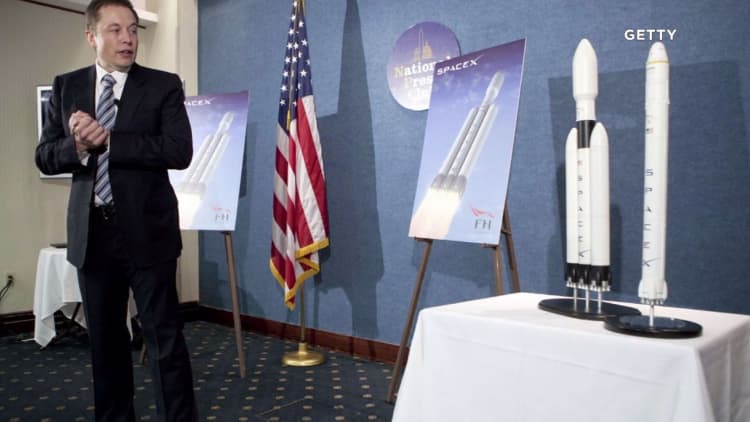
It's a race to Mars for Elon Musk.
"You want to be inspired by things," the SpaceX CEO told an audience of several thousand upon arriving on stage at the 2017 International Astronautical Congress in Adelaide, Australia. "It's about believing in the future and believing the future is better than the past, and I can't think of anything more exciting."
Musk provided an update to his vision last year of creating a permanent, self-sustaining human presence on Mars.
SpaceX aims to do 30 launches next year. According to Musk, there are about 60 launches each year, which means his company could account for half. This year, it's completed 13 out of what Musk said on Friday was a goal of 20.
Last year, Musk laid out his plan to build a 42-engine rocket capable of holding around 100 people.
He said that Interplanetary Transport System will launch people to and from Mars. The booster system was referred to as the BFR.

The BFR is less expensive than the company's Falcon 1, Falcon 9 and Falcon Heavy rocket systems, according to SpaceX.
Musk said he wants to land at least two cargo ships on Mars by 2022, in a move to confirm water resources and identify hazards as well as set up power mining and life-support infrastructure for future flights.
"I feel fairly confident we can build the ship and be ready for the launch in five years. Five years seems like a long time for me," he said.
Additionally, Musk said he wanted ships to take the first people and more equipment and supplies as well as build up a base to prepare for expansion on Mars by 2024, noting he wanted to make the red planet "a nice place to be."
At the same time, Musk added that the same technology could speed transportation on earth.
"If you build a ship that's capable of going to Mars, what if you take that same ship and use it to go from place to place on earth," he asked, showing a promotional video of a rocket taking passengers from New York City to Shanghai in 30 minutes.
How SpaceX will pay for it
Musk said the revenue he's seeing from launching satellites will pay for the costs of BFR.
In addition, Musk recently released a SpaceX space suit, which he says was engineered to handle double vacuum pressure.
SpaceX, which was first started in 2002, has been recently challenging Boeing and Lockheed Martin's long-time monopoly over U.S. military launches. Earlier this year, SpaceX landed a $97 million contract to launch a military satellite.


